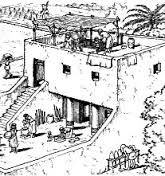I leant my head back against the wall of the parapet. ‘I think my favourite season is the season of planting. It gets so hot and dry between Shavout, which as you know is in the Roman month of May or in our calendar Sivan, and Rosh Hashanah in September or Tishri, that it is really hard work keeping the vegetables in the garden watered. I have to make several trips a day with water from the well just to keep them alive. It is quite a relief when the dry sirocco winds, which come to us from the desert bringing the dry weather, change, and the cooler west sea winds come and bring with them the first cooling rains of the year. Suddenly the dry cracked soil is moist again, and the ploughman can set his oxen to till the land and sow the seeds of wheat and barley to give us bread for the coming year. It is a hard and busy season. Everything has to be done quickly while the land is ready. If the rains come late then it can be a real rush to get everything done. If the rains don’t come at all, then we will face starvation. I and your mother, along with the other women of Nazareth, have to dig over and prepare our gardens. Then we can plant our seeds so that we will have cucumbers, melons, onions, garlic, leeks, peas and beans. We watch our trees carefully and are relieved when new shoots start to grow on the pomegranate, almond, pistachio and date palm trees.’
‘After the First rains, then come the main rains, we hope after Hanukkah in our month of Kislev or what the Romans call December. Our Spring rains come around the time of Purim in the month of Adar which the Romans call February. With all the rain the crops should be swelling and growing.
At this point Nathan, who had finished serving and had helped himself to a drink was sitting on the other side of Jesus listening in to our conversation. He leant over and interrupted. ‘My favourite season is harvest. This year Dad says I am big enough and old enough to try to hire myself out to help with the wheat and barley harvests. I want to save up for a knife. Marco has promised that when I have enough money he will find me a knife on his travels. I want something really special.’ I smiled at him, ‘Well, people are bringing in different harvests for most of the year from the various fruit and nut trees, to the flax, but you will make the most money hiring yourself out for the wheat and barley harvests as they are the biggest crops we grow. The flax harvest starts around Purim in Adar or in the Roman month of February, the barley around Passover in Nisan or March, the wheat is ready for Shavuot.
Jesus looked thoughtful. ‘When you say it all out aloud like that it really does bring home to me how much we depend on Yahweh to give us our rains in their right places, then the dry season to ripen the wheat harvest, and the summer heat to ripen and then dry the dates grapes and figs. The combinations of rain and sun in the right proportions means we will have enough to eat, if we work hard to manage the weeds in the crops and there are no invasions of locusts. Every crop has its place in the cycle of seasons, and no crop can happen in another season. Yahweh is so good to us, giving us our food in due season, and giving us such an abundance of food through the year, so that if one crop fails, there should be another to follow.’ Rabbi David must have caught the tail end of this conversation for he suggested that Jesus explain to the other boys what he and I had been talking about. Jesus went and sat next to the Rabbi and began to speak to the other boys. I quietly gathered my pot and mugs together again, and slipped my way back down the stairs. To every thing there is a time, and it was time now to put my risen bread in the oven to cook for our evening meal.

